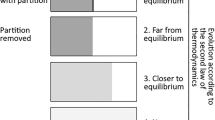Abstract
We analyze the apparent increase in entropy in the course of the spin-echo effect using algorithmic information theory. We show that although the state of the spins quickly becomes algorithmically complex, then simple again during the echo, the overall complexity of spins together with the magnetic field grows slowly, as the logarithm of the elapsed time. This slow increase in complexity is reflected in an increased difficulty in taking advantage of the echo pulse. Our discussion illustrates the fundamental role of algorithmic information content in the formulation of statistical physics, including the second law of thermodynamics, from the viewpoint of the observer.
Similar content being viewed by others
References
E. L. Hahn,Phys. Rev. 80:580–594 (1950).
W.-K. Rhim, A. Pines, and J. S. Waugh,Phys. Rev. B 3:684–696 (1971).
W. H. Zurek,Phys. Rev. A 40:4731–4751 (1989).
W. H. Zurek,Phys. Rev. Lett. 53:391–394 (1984).
E. T. Jaynes and F. W. Cummings,Proc. I.R.E. 51:89–109 (1963).
R. J. Glauber,Phys. Rev. 131:2766–2788 (1963).
W. K. Wootters and W. H. Zurek,Phys. Rev. D 19:473–484 (1979).
R. J. Solomonoff,Information Control 7:1–22 (1964).
A. N. Kolmogorov,Inf. Transmission 1:3–11 (1965).
A. N. Koimogorov,IEEE Trans. Inf. Theor. 14:622–664 (1968).
A. N. Kolmogorov,Usp. Mat. Nauk 25:602–613 (1970).
G. J. Chaitin,J. ACM 13:547–569 (1966).
G. J. Chaitin,Sci. Am. 232:47–52 (1975).
G. J. Chaitin,IBM J. Res. Dev. 21:350–359 (1977).
G. J. Chaitin,Algorithmic Information Theory (Cambridge University Press, 1987).
R. W. Hamming,Coding and Information Theory (Prentice-Hall, Englewood Cliffs, New Jersey, 1986).
C. H. Bennett,Int. J. Theor. Phys. 21:905–940 (1982).
W. H. Zurek,Nature 341:119–124 (1989).
L. Szilard,Z. Phys. 53:840–856 (1929);Behav. Sci. 9:301–310 (1964).
R. Landauer,IBM J. Res. Dev. 5:183–191 (1961).
R. Landauer,Nature 335:779–784 (1988).
C. H. Bennett,Sci. Am. 257:108 (1987).
C. M. Caves, inComplexity, Entropy and the Physics of Information, W. H. Zurek, ed. (Addison-Wesley, New York, 1990).
A. K. Zvonkin and L. A. Levin,Uspekhi Mat. Nauk 25(6):85–128 (1970) [English translation inRuss. Math. Surveys 25(6):83–124 (1970)].
J. Rothstein,Am. J. Phys. 24:510–518 (1957).
S. Lloyd,Phys. Rev. A 39:5378–5386 (1989).
R. P. Feynman, R. J. Leighton, and M. Sands,The Feynman Lectures in Physics (Addison-Wesley, Reading, Massachusetts, 1965).
M. C. Teich and B. E. A. Saleh,Physics Today 43:26–34 (1990).
Author information
Authors and Affiliations
Rights and permissions
About this article
Cite this article
Lloyd, S., Zurek, W.H. Algorithmic treatment of the spin-echo effect. J Stat Phys 62, 819–839 (1991). https://doi.org/10.1007/BF01017985
Received:
Revised:
Issue Date:
DOI: https://doi.org/10.1007/BF01017985



